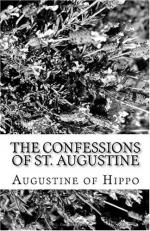
|
| Name: _________________________ | Period: ___________________ |
This test consists of 15 multiple choice questions and 5 short answer questions.
Multiple Choice Questions
1. What concept does Augustine have difficult understanding?
(a) That God has emotions.
(b) That Christ is God and has a body.
(c) That God has no body but loves man who does.
(d) That Christ is the same as others but more enlightened.
2. Who has Augustine already studied much?
(a) The development of Chrisitanity in Britian.
(b) The Platonists and their natural philosophy.
(c) The Greek gods.
(d) The Gnostics.
3. What tempts Augustine in this part of his life?
(a) Women.
(b) Music.
(c) Drink.
(d) Vanity.
4. To what does Augustine come to think the predictions of astrologists are due?
(a) A weakness of the brain.
(b) Purely a matter of chance, plus taking into account a person's condition, wealth, and circumstances.
(c) A misunderstanding of astronomy.
(d) Making the predictions so general, they can apply to almost anyone.
5. Why does Augustine believe it is not the motion of the heavenly bodies that determines the length of a day?
(a) Because God could not have created the earth in 7 earth days.
(b) Because heavenly bodies are in a set relation to each other always.
(c) Because different heavenly bodies move at different speeds.
(d) Because heavenly bodies are motionless and therefore cannot make time move.
6. Why is Augustine angry with the Manicheans?
(a) He is not angry with them.
(b) They changed a very important part of their creed.
(c) They had provided him with an excuse for his behavior for so long.
(d) They ex-communicated him.
7. When does Augustine reject astrology?
(a) When the stars show a pattern not predicted.
(b) When he studies his horoscope for a year and very little comes true.
(c) When it says he was to die when he was 28 and he doesn't.
(d) After speaking to an old man Vindicianus, and also due to the arguments of his friend Nebridius.
8. What does Augustine think would happen if there was really a kingdom of light versus a kingdom of darkness?
(a) The darkness would cover up the light and there would therefore be no light.
(b) God would destroy the kingdom of darkness.
(c) They would cancel each other out and there would be nothing.
(d) The light would outshine the dark and there could then be no dark.
9. What makes it easy for Augustine to quit his job?
(a) He has been suffering from overwork.
(b) He feels God paving the way.
(c) He has not been very popular with the students.
(d) The dean is not happy with him.
10. If two people both believe in the word of God, what can be fruitful?
(a) Compromise on interpretation.
(b) Witnessing to a third.
(c) Debate about interpretations.
(d) Agreement.
11. Why does Augustine publish his Confessions?
(a) To convert pagans.
(b) To earn some money.
(c) To see if there were others out there like him.
(d) So the public to know what he once was and what he is now after his Christian conversion.
12. What differs for each individual and even at different periods of a person's life?
(a) The happy life.
(b) God.
(c) Faith.
(d) Memory.
13. How does God create sky, water and earth?
(a) From thought.
(b) From formless matter.
(c) From the formless part of self.
(d) From molecules of form that he rearranges.
14. How does Victorinus become a Christian?
(a) By studying the Christian Scriptures.
(b) By asking for a revelation from Jesus.
(c) By realizing the simple logic of the Christian doctrine.
(d) By seeing how joyful Christians are.
15. What does the Roman empress Justina favor?
(a) The Arian heresy over Christianity.
(b) The Greek gods over those of the Romans.
(c) The Pope over the Greek gods.
(d) Celtic gods.
Short Answer Questions
1. Where does Augustus go for the Vintage holiday?
2. What do we remember when we are sad?
3. Of what is Augustine reassured?
4. What question does Augustine ask?
5. What does the faithful begin doing under the guidance of Ambrose?
|
This section contains 712 words (approx. 3 pages at 300 words per page) |

|




